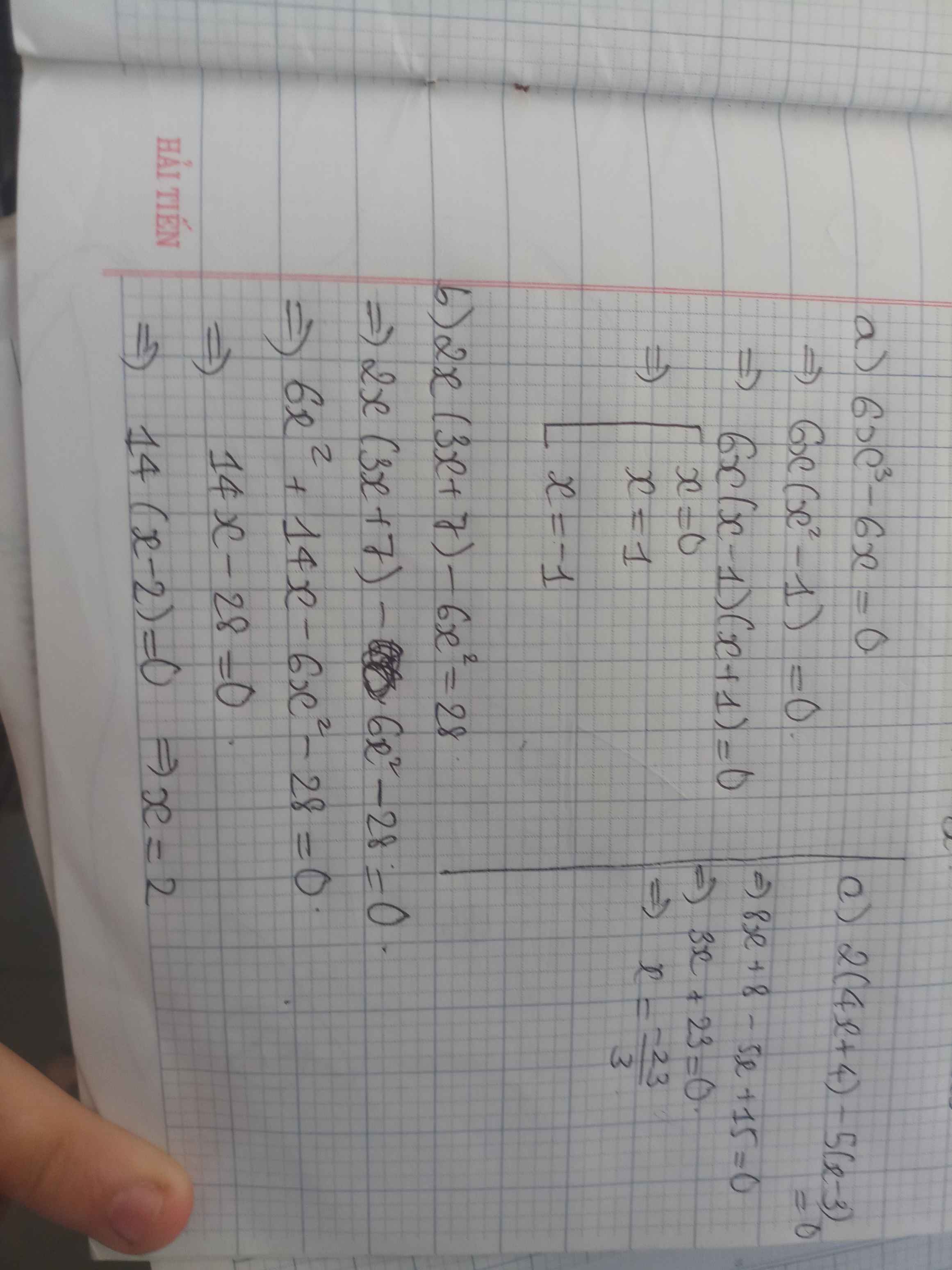5/6x=7/2

Những câu hỏi liên quan
Tìm x:
\(\frac{2x-3}{\left(7-6x\right)^2}+\frac{x-2}{\left(7-6x\right)^2}=\frac{6x-3}{\left(3x-5\right)^2}-\frac{12x-10}{\left(3x-5\right)^2}\)
\(\frac{2x-3}{\left(7-6x\right)^2}+\frac{x-2}{\left(7-6x\right)^2}=\frac{6x-3}{\left(3x-5\right)^2}-\frac{12x-10}{\left(3x-5\right)^2}\)
\(\Leftrightarrow\frac{2x-3+x-2}{\left(7-6x\right)^2}=\frac{6x-3-12x+10}{\left(3x-5\right)^2}\)
\(\Leftrightarrow\frac{3x-5}{\left(7-6x\right)^2}=\frac{7-6x}{\left(3x-5\right)^2}\)
\(\Leftrightarrow\left(7-6x\right)^3=\left(3x-5\right)^3\)
\(\Leftrightarrow7-6x=3x-5\)
\(\Leftrightarrow7+5=3x+6x\)
\(\Leftrightarrow12=9x\)
\(\Leftrightarrow x=\frac{4}{3}\)
Vậy \(x=\frac{4}{3}\)
Đúng 0
Bình luận (0)
a, 6x^3-6x=0
b, 2x(3x+7) -6x^2=28
c, 2(4x+4)-5(x-3)=0
a) \(6x^3-6x=0\Leftrightarrow6x\left(x^2-1\right)=0\Leftrightarrow6x\left(x-1\right)\left(x+1\right)=0\Leftrightarrow\left[{}\begin{matrix}6x=0\\x-1=0\\x+1=0\end{matrix}\right.\Leftrightarrow\left[{}\begin{matrix}x=0\\x=1\\x=-1\end{matrix}\right.\)b) \(2x\left(3x+7\right)-6x^2=28\Leftrightarrow6x^2+14x-6x^2=28\Leftrightarrow14x=28\Leftrightarrow x=2\)
c) \(2\left(4x+4\right)-5\left(x-3\right)=0\Leftrightarrow8x+8-5x+15=0\Leftrightarrow3x=-23\Leftrightarrow x=-\dfrac{23}{3}\)
Đúng 1
Bình luận (0)
a: Ta có: \(6x^3-6x=0\)
\(\Leftrightarrow6x\left(x-1\right)\left(x+1\right)=0\)
\(\Leftrightarrow\left[{}\begin{matrix}x=0\\x=-1\\x=1\end{matrix}\right.\)
b: Ta có: \(2x\left(3x+7\right)-6x^2=28\)
\(\Leftrightarrow6x^2+14x-6x^2=28\)
\(\Leftrightarrow14x=28\)
hay x=2
c: Ta có: \(2\left(4x+4\right)-5\left(x-3\right)=0\)
\(\Leftrightarrow8x+8-5x+15=0\)
\(\Leftrightarrow3x=-23\)
hay \(x=-\dfrac{23}{3}\)
Đúng 0
Bình luận (0)
a) \(x^3+6x-7\)
b) \(4^2+8x-5\)
c) \(9^2-4y^2+6x-4y\)
a) Ta có: \(x^3+6x-7\)
\(=x^3-x+7x-7\)
\(=x\left(x-1\right)\left(x+1\right)+7\left(x-1\right)\)
\(=\left(x-1\right)\left(x^2+x+7\right)\)
b) Ta có: \(4x^2+8x-5\)
\(=4x^2+10x-2x-5\)
\(=2x\left(2x+5\right)-\left(2x+5\right)\)
\(=\left(2x+5\right)\left(2x-1\right)\)
c) Ta có: \(9x^2-4y^2+6x-4y\)
\(=9x^2+6x+1-\left(4y^2+4y+1\right)\)
\(=\left(3x+1\right)^2-\left(2y+1\right)^2\)
\(=\left(3x+1+2y+1\right)\left(3x+2y\right)\)
\(=\left(3x+2y\right)\left(3x+2y+2\right)\)
Đúng 3
Bình luận (0)
\(\left(x^2+6x+5\right)\left(x^2+6x+8\right)=m-1.TimgiatrimdePTconghiemthoax^2+6x+7< 0\)
Đặt \(x^2+6x+7=t\)
Bài toán trở thành tìm m để phương trình: \(\left(t-2\right)\left(t+1\right)=m-1\) (1) có nghiệm \(t< 0\)
\(\left(1\right)\Leftrightarrow t^2-t-1=m\)
Xét hàm \(f\left(t\right)=t^2-t-1\)
\(f\left(0\right)=-1\) và hàm số nghịch biến khi \(t< 0\)
\(\Rightarrow f\left(t\right)>-1\) \(\forall t< 0\)
\(\Rightarrow\) phương trình \(f\left(t\right)=m\) có nghiệm \(t< 0\) khi và chỉ khi \(m>-1\)
Vậy với \(m>-1\) thì pt đã cho có nghiệm thỏa \(x^2+6x+7< 0\)
Đúng 0
Bình luận (4)
Tìm x:
1) -3.(1-2x) - 4.(1+3x) = -5x + 5
2) 3.(2x - 5) - 6.(1 - 4x) = -3x + 7
3) (1 - 3x) - 2.(3x - 6) = -4x - 5
4) x.(4x - 3) - 2x.(2x - 1) = 5x - 7
5) 3x.(2x - 1) - 6x.(x + 2) = -3x + 4
6) (1 - 2x).3 - 4.(6x - 1) = 7x - 5
7) 6x - 3.(1 - 4x) - 5.(x + 1) = 2x + 7
8) 6.(1 - 3x) - 3.(2x + 5) = -10x + 7
9) 3x.(1 - 2x) + 6x^2 - 7x = 8.(1 - 2x) - 9
10) 2x.(1 + 3x) - 3x.(4 + 2x) = 3x - 4
* Trả lời:
\(\left(1\right)\) \(-3\left(1-2x\right)-4\left(1+3x\right)=-5x+5\)
\(\Leftrightarrow-3+6x-4-12x=-5x+5\)
\(\Leftrightarrow6x-12x+5x=3+4+5\)
\(\Leftrightarrow x=12\)
\(\left(2\right)\) \(3\left(2x-5\right)-6\left(1-4x\right)=-3x+7\)
\(\Leftrightarrow6x-15-6+24x=-3x+7\)
\(\Leftrightarrow6x+24x+3x=15+6+7\)
\(\Leftrightarrow33x=28\)
\(\Leftrightarrow x=\dfrac{28}{33}\)
\(\left(3\right)\) \(\left(1-3x\right)-2\left(3x-6\right)=-4x-5\)
\(\Leftrightarrow1-3x-6x+12=-4x-5\)
\(\Leftrightarrow-3x-6x+4x=-1-12-5\)
\(\Leftrightarrow-5x=-18\)
\(\Leftrightarrow x=\dfrac{18}{5}\)
\(\left(4\right)\) \(x\left(4x-3\right)-2x\left(2x-1\right)=5x-7\)
\(\Leftrightarrow4x^2-3x-4x^2+2x=5x-7\)
\(\Leftrightarrow-x-5x=-7\)
\(\Leftrightarrow-6x=-7\)
\(\Leftrightarrow x=\dfrac{7}{6}\)
\(\left(5\right)\) \(3x\left(2x-1\right)-6x\left(x+2\right)=-3x+4\)
\(\Leftrightarrow6x^2-3x-6x^2-12x=-3x+4\)
\(\Leftrightarrow-15x+3x=4\)
\(\Leftrightarrow-12x=4\)
\(\Leftrightarrow x=-\dfrac{1}{3}\)
Đúng 0
Bình luận (0)
* Tìm X
a/ ( x+2)2+ ( x-3)2 - 2(x-1)(1+x) = 9
b/ ( 3x - 1)2+ (3x+1)2- 18( x-2)(x+2) = 5
c/ ( 6x-5)2 - ( 6x +7)(6x-7) + 4( x-3) = 8
1)5x+2(x+1/2)=7
2)8x-3(x+2)=9
3)5(x-2)+3(x-1)=19
4)7(x-3)-2x-5=11
5)6x+3-2(x-5)=30
6)8(x-1/8)-5(x-1/5)=10
7)13x-5-2(x+3)=1
8)4(x-2)-2(x-1)=12
9)6x-13-2-(x×5)=7
10)7(x-5)-3(x+5)=30
Dễ thế mà không làm được thì bạn nên xem lại nhé,một hai câu thì còn được chứ cả 10 câu thế kia rõ là ỷ lại rồi bạn ạ.Thân!
Đúng 1
Bình luận (0)
Giải pt
\(x^2-6x+\sqrt{x^2-6x+7}=5\)
Lời giải:
ĐKXĐ:......
Ta có:
\(x^2-6x+\sqrt{x^2-6x+7}=5\)
\(\Leftrightarrow x^2-6x+7+\sqrt{x^2-6x+7}=12\)
Đặt \(\sqrt{x^2-6x+7}=a(a\geq 0)\). Khi đó pt trở thành:
\(a^2+a=12\)
\(\Leftrightarrow a^2+a-12=0\)
\(\Leftrightarrow (a-3)(a+4)=0\Rightarrow a=3\) (do $a\geq 0$)
\(\Rightarrow x^2-6x+7=a^2=9\)
\(\Rightarrow x^2-6x-2=0\)
\(\Rightarrow x=3\pm \sqrt{11}\) (thỏa mãn)
Vậy........
Đúng 0
Bình luận (0)
\(ĐKXĐ:x^2-6x+7\ge0\)
ĐẶt: \(n=\sqrt{x^2-6x+7}\left(n\ge0\right)\)
\(\Leftrightarrow n^2-7=x^2-6x\)
Phương trình thành:
\(n^2-7+n=5\)
\(\Leftrightarrow n^2+n-12=0\)
\(\Leftrightarrow n^2+2\cdot n\cdot\dfrac{1}{2}+\dfrac{1}{4}-\dfrac{1}{4}-12=0\)
\(\Leftrightarrow\left(n+\dfrac{1}{2}\right)^2-\dfrac{49}{4}=0\)
\(\Leftrightarrow\left(n+\dfrac{1}{2}\right)^2=\dfrac{49}{4}\)
\(\Rightarrow\left[{}\begin{matrix}n+\dfrac{1}{2}=\dfrac{7}{2}\\n+\dfrac{1}{2}=-\dfrac{7}{2}\end{matrix}\right.\Rightarrow\left[{}\begin{matrix}n=3\\n=-4\end{matrix}\right.\)(loại n=-4)
Với n=3
\(\Rightarrow\sqrt{x^2-6x+7}=3\)
\(\Leftrightarrow x^2-6x+7=9\)
\(\Leftrightarrow x^2-6x-2=0\)
\(\Leftrightarrow x^2-2\cdot x\cdot3+9-9-2=0\)
\(\Leftrightarrow\left(x-3\right)^2=11\)
\(\Rightarrow\left[{}\begin{matrix}x=\sqrt{11}+3\\x=-\sqrt{11}+3\end{matrix}\right.\)
Đúng 0
Bình luận (0)
Tìm x :
3/7 x x = 1/3
x : 6/8 = 2/5
x - 2/3 = 5/6
x - 2/5 - 4/35 = 1/7
\(\dfrac{3}{7}\times x=\dfrac{1}{3}\)
\(x=\dfrac{1}{3}:\dfrac{3}{7}\)
\(x=\dfrac{7}{9}\)
\(x:\dfrac{6}{8}=\dfrac{2}{5}\)
\(x=\dfrac{2}{5}\times\dfrac{6}{8}\)
\(x=\dfrac{6}{20}=\dfrac{3}{10}\)
\(x-\dfrac{2}{3}=\dfrac{5}{6}\)
\(x=\dfrac{5}{6}+\dfrac{2}{3}\)
\(x=\dfrac{9}{6}=\dfrac{3}{2}\)
\(x-\dfrac{2}{5}-\dfrac{4}{35}=\dfrac{1}{7}\)
\(x=\dfrac{1}{7}+\dfrac{4}{35}+\dfrac{2}{5}\)
\(x=\dfrac{23}{35}\)
.
Đúng 1
Bình luận (0)
\(\dfrac{3}{7}\times x=\dfrac{1}{3}\)
\(\Leftrightarrow x=\dfrac{1}{3}:\dfrac{3}{7}\)
\(\Leftrightarrow x=\dfrac{7}{9}\)
\(x:\dfrac{6}{8}=\dfrac{2}{5}\)
\(\Leftrightarrow x=\dfrac{2}{5}\times\dfrac{6}{8}\)
\(\Leftrightarrow x=\dfrac{3}{10}\)
\(x-\dfrac{2}{3}=\dfrac{5}{6}\)
\(\Leftrightarrow x=\dfrac{5}{6}+\dfrac{2}{3}\)
\(\Leftrightarrow x=\dfrac{3}{2}\)
\(x-\dfrac{2}{5}-\dfrac{4}{35}=\dfrac{1}{7}\)
\(\Leftrightarrow x=\dfrac{1}{7}+\dfrac{2}{5}+\dfrac{4}{35}\)
\(\Leftrightarrow x=\dfrac{23}{35}\)
Đúng 1
Bình luận (0)
Xem thêm câu trả lời


























